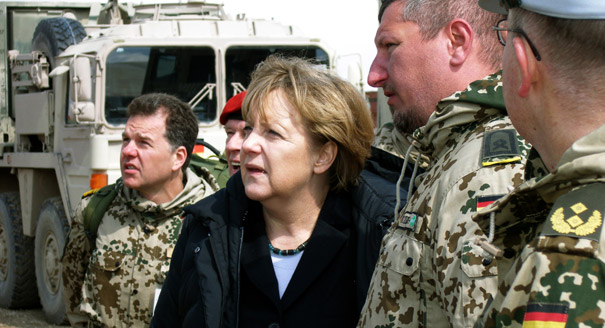Germany has been under heavy criticism-especially from the French-for not giving more military support to France’s mission in Mali. French, but also German commentators, have accused Chancellor Angela Merkel’s center-right government of refusing to face up to its security and defense responsibilities.
Germany, which has provided two transport aircraft to the African force helping France and is offering to set up a field hospital in Mali, has only half-heartedly tried to rebuff this criticism.
Thomas de Maizière, the German defense minister, said at last weekend’s Munich Security Conference, that Germany’s armed forces were already pulling their weight in Afghanistan and in Kosovo. But he failed to explain his deep concern about the security risks the remaining NATO troops in Afghanistan would be exposed to once U.S. troops start leaving, including his own reservations about the Mali mission.
Now comes a trenchant essay by Elke Hoff, defense and security spokesperson for the German Bundestag’s group of the governing Free Democrats. In the piece entitled “No German participation in a Mali mission without a clear goal,” published in the latest issue of Internationale Politik, Hoff sets out her position. “Military power,” she writes, “is not the solution.”
Hoff is no pacifist. But she has seen first-hand the consequences of using military power in Kosovo, Iraq, Afghanistan, Libya, and now Mali.
Her point is that NATO and the EU still haven’t learned the most important lesson from those missions. “Before you use military power, you have to think of the day after,” she told Carnegie Europe. “That didn’t happen in Kosovo, Iraq, Afghanistan, or Libya. Why should Mali buck the trend?”
Hoff is not optimistic.
“The French in Mali are desperate for EU help because they are not sure that the Malian army and the Africans can provide the crucial military backup and then take over,” she said. That is why French President François Hollande asked the UN to provide a peace-keeping force in the country this week. “France is afraid that it will get bogged down in Mali,” Hoff added.
A quick exit rarely seems to be possible.
Just look at Kosovo. Astonishingly, NATO forces are still deployed in Kosovo today, nearly thirteen years after they bombed Serb positions in order to stop the ethnic cleaning of the Albanians in Kosovo. NATO presence today still stands at 6,500 soldiers who are helping to keep the peace and maintain stability. The EU’s soft-power mission to strengthen the police and judicial forces is deemed ineffectual and of little use to NATO. And this is Europe’s back yard.
In Iraq, U.S. and British forces have left the country riven with corruption, squabbling over the ownership of oil and gas fields, and a sectarianism that claims lives in depressing regularity. So much for the day after planning there.
Hoff is particularly worried about Afghanistan where NATO forces will wind down their combat operations next year. “And then what?” she said. “German troops will be the last to pull out. We have stayed the course in Kosovo and we are staying the course in Afghanistan. We are reliable. And we should say so. We have nothing to be ashamed about.”
As for Libya, France is now dealing with the consequences of not having planned for the day after. Surely in 2011-when the French government, together with Britain-pressed for military intervention against Colonel Muammar Gaddafi’s regime, its intelligence sources had some idea of the number of well-armed mercenaries in the country.
Yet neither French nor British troops prevented the mercenaries from leaving the country with their equipment intact, once it became clear that Gaddafi’s days were numbered. Many of the fighters withdrew into Northern Mali to foment the indigenous Tuareg movement’s rebellion against the Malian government.
To this day, NATO officials are loath to criticize the Libya mission. But maybe it’s not too late to learn from those mistakes as the EU prepares to send up to 250 officers to train the Malian army.
Hoff is highly critical of this mission that will take place under the umbrella of EU crisis management. She fears that the risk of the conflict escalating has not been factored into the EU mission. Emergency procedures are inadequate, she claims. The European soldiers who are going in as trainers will not be sufficiently protected from attacks. Yet it is not as if the EU didn’t have enough time to think about this mission. It has been working on it for many months.
Germany, according to this German Liberal parliamentarian, has decided to send soldiers to the EU training mission, not because it believes in the venture, but because it wants to demonstrate that Europe is working together. That, says Hoff, is not a good enough reason.
Still, there are sound reasons for every European country to actively support France’s intervention. Not least of all for fear of themselves becoming targets of Islamist terrorists operating from the Sahel. The dangers may be so real and so immediate that it would be reckless to wait until a proper, water-tight day after plan has been drawn up. But in the longer-term, it may prove to be equally reckless to continue to neglect planning for a sound exit strategy.



.png)

.png)
